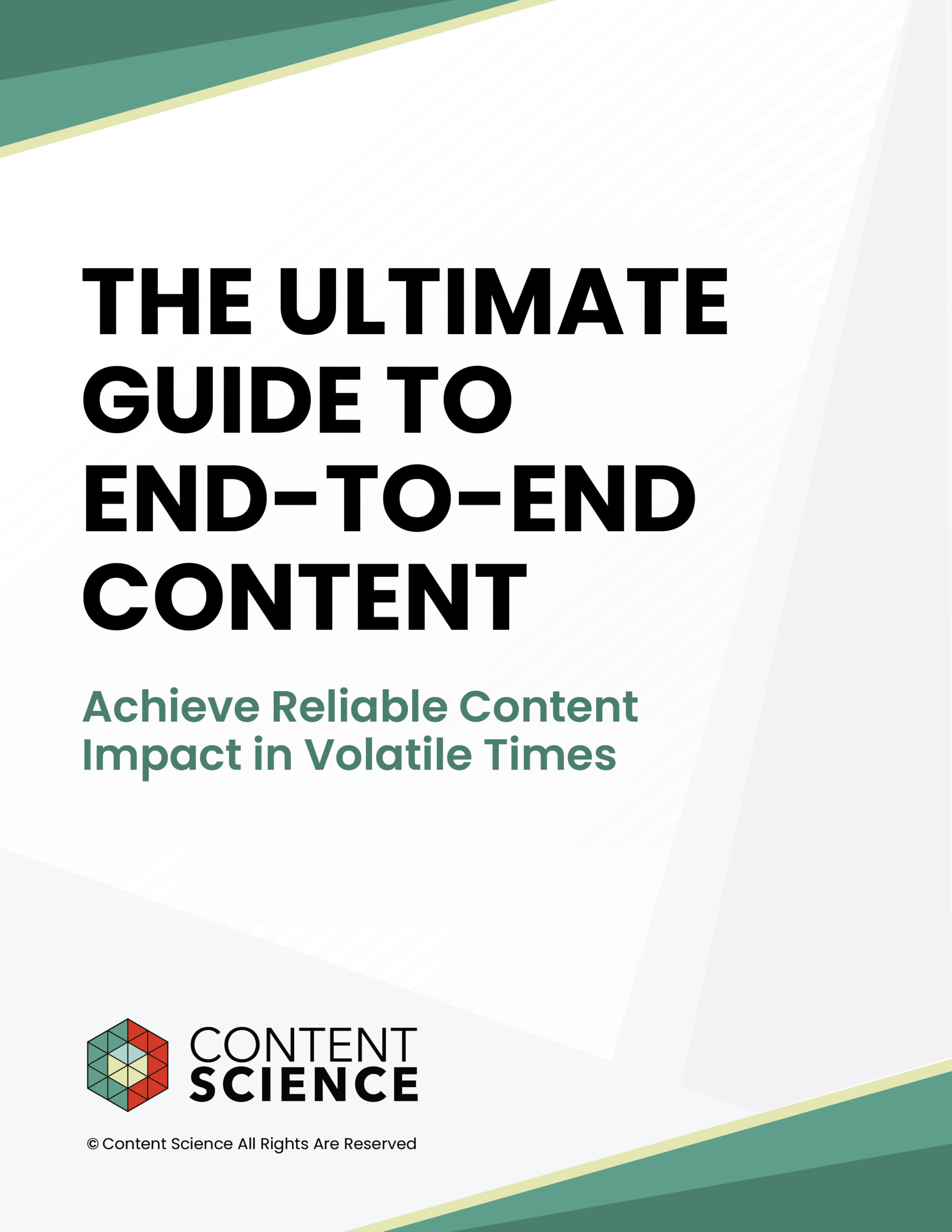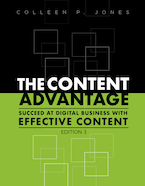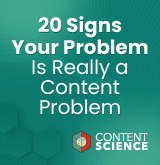
A content analyst is a key position to fill on your team as your enterprise scales content operations and AI (artificial intelligence) adoption. Content analysts set up a system of content intelligence to track and analyze content effectiveness and, in so doing, evaluate a variety of metrics to determine impact and ROI (return on investment). The work of a content analyst informs decisions ranging from content and AI strategy to content optimization tactics.
But what is a content analyst at a more granular level, what does a content analyst do from day to day, and how do you get into this field? This article gives a useful start on the answers.
Why Do Organizations Need Content Analysts?
In the latest update of our ongoing study of content operations, we found that only 50% of organizations report measuring content effectiveness or impact, but those organizations report the most success with content and AI. Content measurement at scale (also known as content intelligence) is a top success factor for scaling content operations and AI. Content analysts move an organization forward in ways including but not limited to these.
Data-Informed Decision Making in Content Strategy and Tactics
As companies scale content creation, knowing what works and why is no longer optional. Content analysts help shift content strategy from guesswork to evidence-based insights, identifying which content drives conversions, retention, or engagement as well as opportunities to optimize it.
Efficiency + Resource Optimization in Content Operations
Content operations are a significant investment. Analysts help teams allocate effort and budget wisely by highlighting underperforming content, identifying content decay, and recommending where to re-invest resources.
AI Integration + Accountability in Content Operations
With generative AI playing an increasing role in content creation, workflow, and other use cases, organizations need governance. Content analysts, for instance, help assess the quality of AI-generated content, measure its performance, and help identify where guardrails are needed. This ensures AI content remains aligned with brand voice, search intent, and user trust.
Competitive + Customer Insight in Content Strategy
By analyzing areas such as sentiment, topics, and engagement patterns, a content analyst surfaces what customers or audiences care about—and what competitors are doing. This gives teams insight to shape content strategy that resonates and differentiates.
What Does a Content Analyst Do?
A content analyst generally works as part of a digital, marketing, UX, or product team. As a content analyst, you will help set goals, strategy, and standards for content. You will work closely with content strategists, designers, developers, SEO specialists, researchers, and / or marketing staff. Content analysts partner with these team members to establish KPIs and design content intelligence dashboards to monitor and improve content performance.
Regularly, you’ll need to analyze data, identify trends, and deliver actionable insights to stakeholders that can help improve content and user experience. Content analysts are experts on metrics such as unique visitors, page views, time on site, bounce rate, scroll depth, conversion rate, etc. You will likely also perform competitive analysis: exploring what competitors are doing, and opportunities for your organization based on insights from this research.
Content analysts may also be responsible for tasks such as researching topics for articles and creating outlines, monitoring social media sentiment, conducting experiments, carrying out surveys, and interpreting findings. You will likely also play a role in identifying any gaps in the content tech stack, and help make decisions around selecting and procuring relevant content evaluation and tracking tools.
In short, here is a list of core responsibilities that are typical for a content analyst.
- Define and Align Metrics
Work closely with content strategists, marketers, product, and UX teams to set meaningful KPIs (e.g., engagement, conversion, retention, SEO metrics). - Build & Maintain Dashboards
Create dashboards that track content health, audience behavior, content decay, and performance over time — using analytics tools (GA4, BI platforms). - Conduct Content Audits
Perform regular content inventories to assess what exists, what’s redundant, and what should be refreshed — employing both quantitative data and qualitative judgment. - Run Experiments
Design A/B tests or content experiments (e.g., headline variations, AI vs. human content) to validate hypotheses and improve performance iteratively. - Analyze Audience Behavior
Leverage user journey data, search intent, scroll depth, bounce rates, and more to uncover content opportunities or gaps. - Perform Competitive & Trend Analysis
Use content intelligence tools, social listening, and semantic analysis to understand market positioning, topical themes, and content trends. - Report & Recommend
Translate data into actionable insights for stakeholders. Recommend content to retire, refresh, or scale, backed by clear business impact.
Now let’s consider how these responsibilities require specific skills.
What Are the Skills or Competencies Necessary to be a Content Analyst?
To be successful, a content analyst today needs a mix of analytical, technical, and strategic capabilities like these:
- Analytical & Critical Thinking: Comfortable with data, but also able to question what the data really means.
- Communication & Storytelling: Translate complex insights into simple, actionable recommendations.
- Technical Fluency: Experience with analytics platforms (e.g., GA4), BI tools (Looker, Power BI), and possibly SQL.
- Content Strategy Knowledge: Understand SEO, content audits, user experience, and semantic structure.
- AI & NLP Literacy: Know how to evaluate AI-generated content, use content intelligence tools, and interpret sentiment or topic modeling.
- Experimentation Design: Ability to formulate hypotheses, run A/B tests, and interpret results.
You should bring an in-depth understanding of content analysis to the table, making use of multiple data sources, from digital analytics to competitive analysis, surveys, and market research. You should be able to parse large amounts of data quickly, think critically, and identify the most important information. There is an ever-growing set of tools available to help with collecting data, but understanding and making sense of that data is up to you.
And your content analysis skills are most useful in tandem with strong communication skills. You will need to interpret data for others, conveying your findings clearly, concisely, and effectively so that they can act on it. While you might not be responsible for final content and AI recommendations, you typically are responsible for accurate interpretation of the data informing those recommendations.
Experience with the process of content creation and the content development process will also be helpful in your role as a content analyst. You may be called on to research a topic, find authoritative sources, and incorporate relevant keywords for SEO purposes.
Still intrigued? Wondering how to get into this field? Read on.
How Can I or a Member of My Team Become a Content Analyst?
Here are steps someone can take to enter or upskill a member of your team into this role:
Invest in Education & Training
- Higher education degree or coursework in marketing, business, data analytics, or a related field.
- Professional training such as certifications and courses with Content Science Acaademy.
- Certifications in analytics (e.g., Google Analytics), BI tools, and tools like ContentWRX.
Build Experience
- Start by working on content audits, reporting, or basic analytics.
- Volunteer to run A/B tests or help measure content ROI in your current role.
- Experiment with AI tools and evaluate their performance.
Develop a Portfolio
- Create case studies: Content inventory + audit you performed, a dashboard you built, or experiments you ran.
- Document how your insights drove content decisions.
Stay Current
- Read about content intelligence, natural-language processing, and AI ethics.
- Experiment with content intelligence platforms.
- Join communities of content operations or content strategy professionals.
What are Key Trends Shaping the Content Analyst Role?
1. AI and Generative Content
- Analysts now evaluate the performance of AI-generated content, measuring quality, trust risk, and engagement.
- AI-driven content intelligence platforms (using NLP, topic modeling, clustering) allow analysts to uncover content patterns at scale.
2. Real-Time + Predictive Insights
- Demand for real-time content analytics is rising, enabling teams to react faster and optimize more dynamically.
- Predictive models (using augmented analytics) help forecast which content will resonate or decay.
3. Content Analytics Market Growth
- The global content analytics market continues to grow, driven by demand for personalization, customer intelligence, and real-time analysis.
- Adoption is increasing across industries, from media and entertainment to financial services.
4. Data Literacy + Democratization
- While content teams increasingly rely on analytics, many still lack confidence in data interpretation.
- Content Analysts are becoming not just data consumers but educators — helping teams understand and act on content data.
Summary
A content analyst is a hybrid of data strategist, content auditor, researcher, and experimenter. They transform raw content data into meaningful business value and guide content teams toward smarter decisions. As content scales across formats and channels, and as AI becomes a bigger part of the workflow, this role isn’t just valuable—it’s indispensable.
Events, Resources, + More
New Data: Content Ops + AI
Get the latest report from the world's largest study of content operations. Benchmarks, success factors, commentary, + more!
The Ultimate Guide to End-to-End Content
Discover why + how an end-to-end approach is critical in the age of AI with this comprehensive white paper.
The Content Advantage Book
The much-anticipated third edition of the highly rated book by Colleen Jones is available at book retailers worldwide. Learn more!
20 Signs of a Content Problem in a High-Stakes Initiative
Use this white paper to diagnose the problem so you can achieve the right solution faster.






Comments
We invite you to share your perspective in a constructive way. To comment, please sign in or register. Our moderating team will review all comments and may edit them for clarity. Our team also may delete comments that are off-topic or disrespectful. All postings become the property of
Content Science Review.